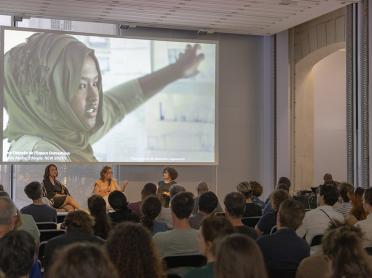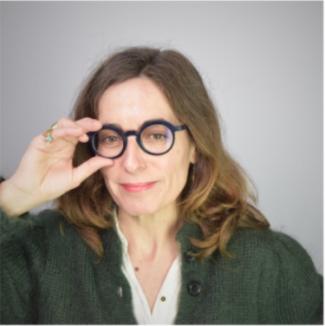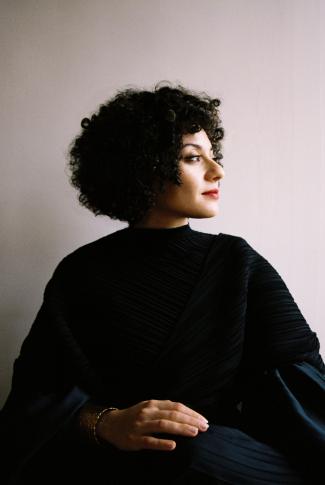Architecture and cinema, a crossroads
Monday 16 Jun 2025 from 7pm to 8:30pm
Free on booking
Talk in french

By bringing together architects and filmmakers who share common concerns, this series of talks, conceived and hosted by Le Monde journalist Isabelle Regnier, aims to break down the barriers that tend to divide disciplines and explore new perspectives and new ways of looking at things.
This first gathering brings together Meriem Chabani, an architect involved in the exploration of territory without borders, defined by the people who live on its margins, and film-maker Leïla Kilani, author of fiction and documentaries in which the question of individual emancipation is caught in the net of a global political context and the movement of History in progress.
Her career as a journalist began in 2000 after a period spent working for cultural institutions in New York and then Hong Kong. She first worked for the magazine Les Cahiers du cinéma, where she covered the economics of cinema and cultural policy (under the pseudonym Anne Ballylinch). She then joined the editorial staff of Le Monde in 2002. After fifteen years as a critic in the cinema section, she was given responsibility for the newspaper's architecture and heritage section. Isabelle Regnier is the author of two documentaries, La Rue est à eux (2010) and Pièce Montée (2012). Winner of the Prix de la critique de l'Académie d'architecture in 2019, she has contributed to several books: Jacques Rozier, le Funambule (Cahiers du cinéma, 2001), Elles construisent, portraits d'architectes franciliennes (Maison de l'architecture d'Ile-de-France, 2024), La Fondation danoise: Kaj Gottlob (Still, 2025). She also teaches as part of the Arts master's programme at the Ecole Nationale Supérieure and the cultural journalism master's programme at the Sorbonne Nouvelle.
At the intersection of project management and research, she explores the social, political and economic dynamics that shape territories and their architecture. Her work on complex sites includes the Swann Arr cultural centre in Myanmar, the Globe Aroma art centre for refugees in Brussels, and a future mosque in Paris. She currently teaches at the École d'Architecture Paris-Malaquais - PSL (FR) and the Harvard Graduate School of Design (USA). Her projects have been presented at the Venice Biennale, the Lagos Biennale, the Istanbul Biennale, the MAXXI Museum and the Oslo Triennial. In 2020, she was awarded the Europe 40 Under 40 prize by the Centre Européen d'Architecture and the Chicago Athenaeum. In 2023, AMC recognised her as one of the emerging female figures in the profession. In 2025, Le Monde named her as one of the personalities to watch in the world of culture.
Leila Kilani has always dreamed of being a clown. She is passionate about different forms of narrative and storytelling. She makes hybrid documentaries, feature films, cinematographic and experimental films, and writes television series.
Her work has been selected for numerous film festivals, including Cannes, Locarno, Rotterdam, Venice and San Sebastian. Her films have received excellent critical acclaim.
She has been making films since 2001, including Tanger, le rêve des brûleurs (Grand Prix documentary at Fespaco, Tanit d'or at Carthage...) and Nos lieux interdits, which explores the memory of political violence in Morocco, Sur la Planche, which was screened at the Cannes Festival and at some 70 other festivals, winning numerous awards and critical acclaim. Her latest drama Indivision had its world premiere at the Rotterdam Festival. Critically acclaimed, it has been selected for some thirty festivals.
She is the founder of Jardin des Coïncidences, a cross-disciplinary collective that brings together artists, lawyers, researchers, designers, engineers and citizens around a shared ambition: to prototype the future. At the crossroads of art, law and critical thinking, the collective designs exploratory projects combining investigation, fiction and collective creation. One of its flagship projects is Les Procès 2080, an exercise in legal and political anticipation that imagines today's responsibilities in the light of tomorrow's world.


